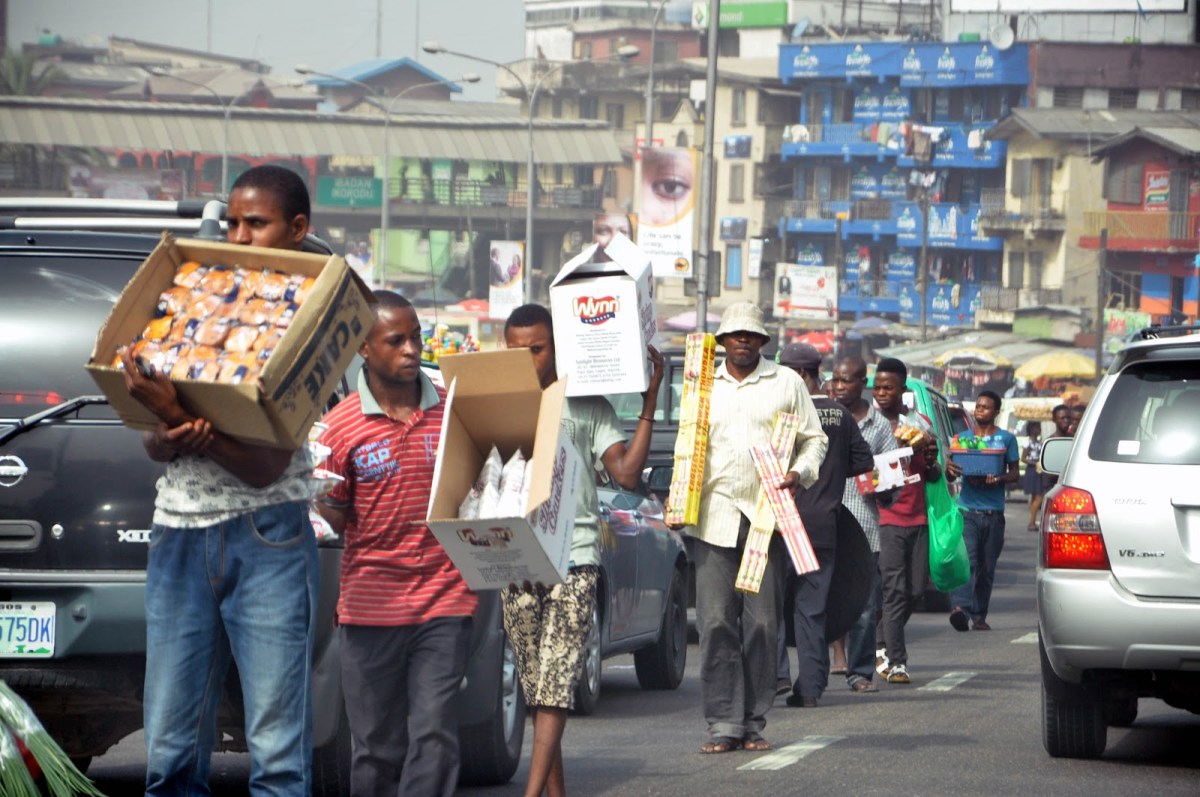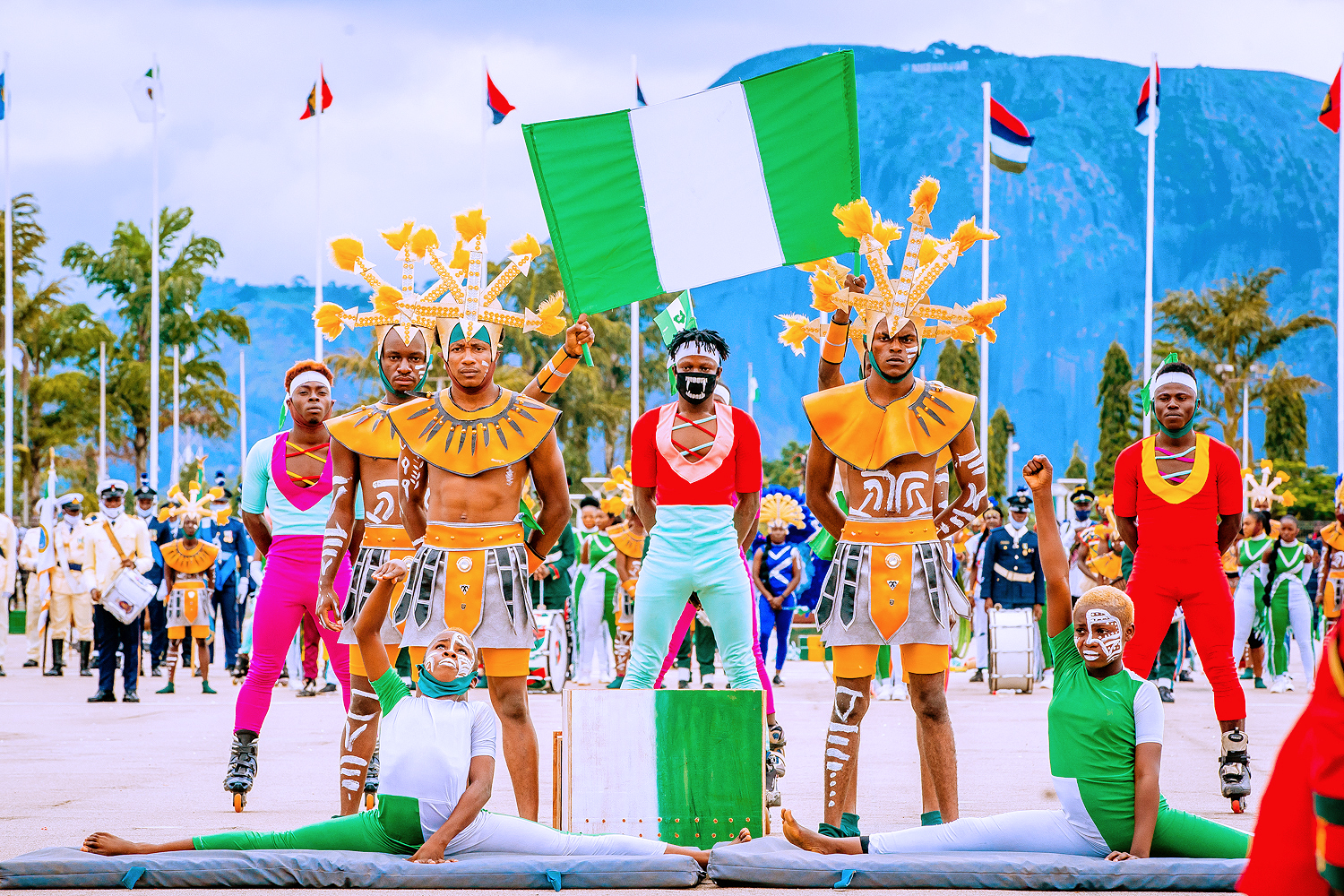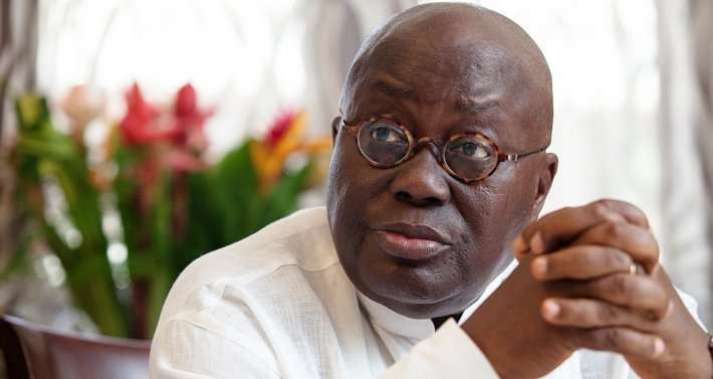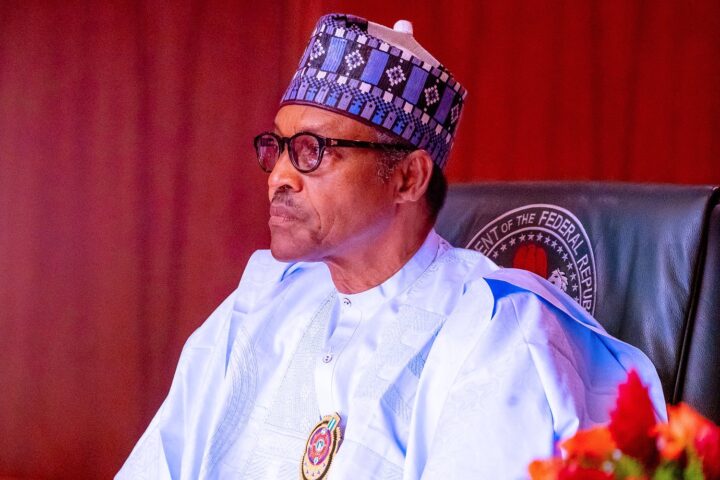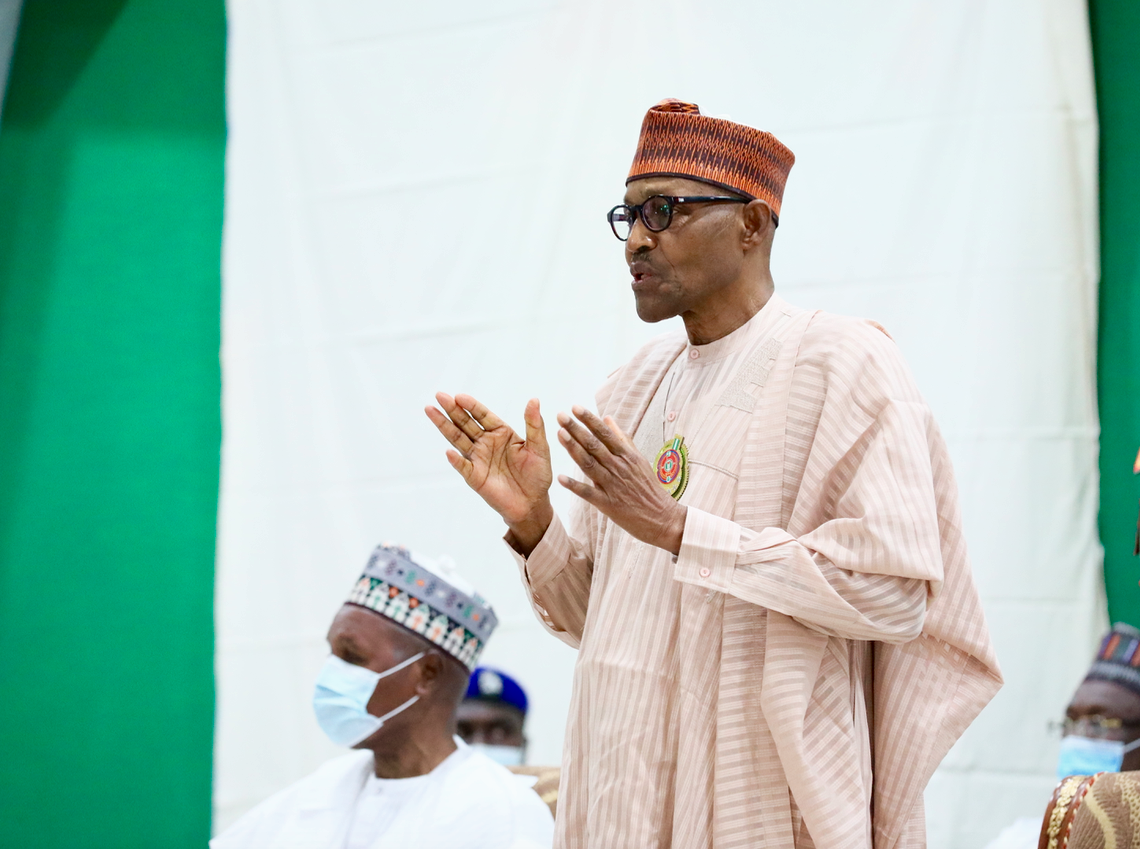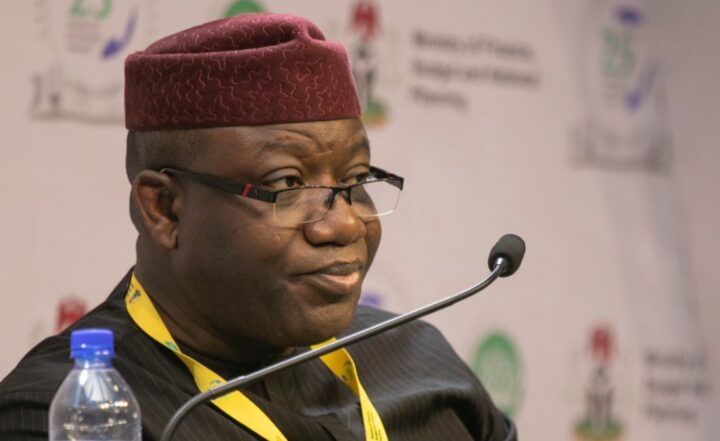As I drove out of my office last Friday, I noticed a slight commotion on the opposite side of the express road. I sighted a truck belonging to the Abuja Environmental Protection Board, and soon enough, I saw this poor woman, begging on her knees as agents of the (AEPB) seized her wares and were about to empty same into the back of their wagon. Instinctively I just knew I had to plead for this woman. I had seen so many heartbreaking situations such as this and not been able to do anything about them, but this time I drove across the road and blocked the truck. I came down to intervene and asked the AEPB team what they had to gain by giving this middle-aged poor woman grief this afternoon. The team leader was a stern-looking rough guy and he made to challenge me. I told him I came in peace but there was no way I was going to watch them take the wares that may not have been worth more than N2,000 from this woman.
The guy barked at me; “Oga Senator! Na una make the law. If you want to challenge me…!”. Stop there my brother, I answered. People are suffering in this country and we cannot make their lives worse, I intoned. He piped down, told me “Na you go pay her fine o!”, and told the truck driver “Collect N5,000 for fuel from Oga make we go”. I peeped into the back of the truck and saw loads of oranges and other knick-knacks they had seized from poor hawkers for the day. Many souls had been distraught that Friday afternoon; a lot of people had lost at least some of the hope they had. Say, how many of us – educated and fortunate – can take such trauma; going out on a day and having your hope dashed, being set back, maybe even resulting in defaulting on some high-interest loan we had obtained as leverage? I started thinking of how many people had been disappointed down the food chain, branded as liars, never trusted again as a result of their tiny survival wares being seized and destroyed?
These were poor enforcers further damaging the poor. Of course, amid laughter and brickbats, I gave them N2,000 for their fuel, gave the lady N1,000 for her trauma and asked her to take her wares (like some kpof-kpof and drinks), into the street corner. There was a construction site there that she tried to service. The AEPB guys have been in overdrive lately; Christmas is coming. I do support keeping the streets clean and devoid of street hawkers and all, but that strategy seems to have broken down in Nigeria. You cannot keep seizing, wasting and burning the livelihoods of these extremely poor people without coming out with some really revolutionary approach to take them out of poverty once and for all. Our poor people are not being led out of their poverty. They are only being traumatized instead. And that is a big cause for concern, especially since Nigeria’s unacceptable poverty has become a global issue of discourse.
The next day, I made a dash to Lagos, and as part of my itinerary I had to make a dash to Ogba, Ikeja; a suburb. I had lived near there before relocating to Abuja and my idea was that Ogba is not particularly one of the poorest areas of Lagos. But when I got to the place, opposite Excellence Hotel, my heart sank. Since I stopped living in Lagos in 2001, things have only gone worse for this area and the people. I saw very deprived people, many with broken limbs. Others with obvious drug problems. The majority of people living in this area had stress written all over their faces. I saw broken dreams. I was reminded of why most Nigerians have given up on themselves and the prospects of living in a good country. The plaza I visited itself was dirty and run down. Yet there were Nigerians trying to make ends meet as entrepreneurs there. A gift shop here, a lawyer’s chambers there. Grime everywhere. This urban area is not renewing itself. Ok, there was a six-story building by the junction, the best effort perhaps at urban renewal. I imagined the six-story rather being swallowed up by the rundown surroundings. Beyond the dilapidation of infrastructure really, is the dilapidation and devaluation of the people. Our people.
Advertisement
On the upside, my Uber driver was this interesting chap from Adamawa (you could mistake him for an Igbo man from his accent even though he says because he is dark most people say he is a Ghanaian). He told me the interesting story of how he managed to purchase the Toyota Corolla from Ecobank for a mere N84,000, just weeks after he had almost given up on life. He said he borrowed N10,000 and laid it down on the altar of a church and told God it was all over if he wasn’t fixed. Then the miracle happened such that upon disengagement from Ecobank as a driver, the N84,000 was deducted from his entitlement and he had some change. He has been managing his life ever since. I asked him what University he attended – as I have met so many well-educated Nigerians in that circuit. He said he had only a Secondary School Certificate, but he believes if he meets the Queen of England he will hold his own. For someone who used a word like ‘apathy’ in the normal cause of conversation and spoke impeccably, you can imagine how intelligent this guy, Jerry, was. When I prodded why he still will not continue his education given the availability of all sorts of online learning, he answered very responsibly that he believed his junior ones whom he is supporting, now need the education more than he does. He seemed to have accepted his estate as a successful Uber driver. At least I met one person who luckily hadn’t been broken.
Back to the issue. Nigerian youths fired a very effective salvo recently by way of the #EndSARS protest. The pros and cons of that effort have been well-discussed but like our people say, for as long as you have lice on your scalp you will always have blood in your fingernails when you scratch. The problems of this country have not been adequately and honestly dissected. The kind of people who were at the forefront of #EndSARS were very privileged compared to the tens of millions who have been rammed down into despair by our dishonesty and laziness of thought. All the strategies our governments have been applying have not made a dent, yet the population of the abjectly poor – the woman selling N2,000 worth of oranges for her and her children’s survival, the drug-addled area boy, the runaway bus conductor whose parents cannot tell where he is, the mentally-challenged plodding the streets of our urban areas with no place to sleep, the excluded, the forgotten, the non-existent – keeps ballooning in geometric proportion. Nigeria’s brand of capitalism has since collapsed. I must admit though, reading a communication from Femi Adeshina recently, that the Buhari Administration has been a bit more activist in pushing out some of the palliatives, especially those encouraging youths to go into entrepreneurship. One could argue that the times have forced the government’s hands – COVID-19 came and the world is in a recession, with every country borrowing and trying to spend their ways out.
The inefficiency and corruption that decimates every good idea in Nigeria continues to rear its head. Old ways are still largely intact. Our 2021 budget is still based on the ‘envelop system’ meaning that ministries and agencies of government still conjure up what they think they will need and are merely given a random haircut off of their requests. This opens us all to more inefficiency, misappropriation and fraud. Our top politicians continue to max out on their own conveniences even when it is obvious that they are not scratching the surface of the problem and one wonders why they asked to serve in the first place if they haven’t contemplated the enormity of the human crisis Nigeria is under. What I saw in Lagos is only a microcosm of what is present all over Nigeria. I didn’t even get to real inner-city Lagos but I remember what I saw around Itire during the campaigns. I also understand that urban poverty can be oh so crushing because nobody gets anybody’s back, unlike in our rural areas.
Advertisement
Hmmm. What Nigeria will require from a focused and determined government will be enormous, and as I stated earlier, revolutionary. Gurus define leadership as the ability to take your followers to where they NEED, not want, to be – whether they like or understand why or not, in fact, kicking and screaming where necessary. The kind of poverty I am talking about here is the type that has eroded the minds of millions of our people. Many just move around mindlessly every day. No work. No destination; maybe with the hope of running into someone to ‘rag’ – as in a rag day – for a few bucks. In time these otherwise normal people fall into drug use, little crimes, and all sorts. Something needs to be done to actively reset the minds and lives of too many millions of our people. The government that will do that work must give everything of itself, and more. No time for luxuries. No time for even basics. Total, 100% honesty. The actions to be taken to help these people may not even be democratic in nature. I recall comedian Michael Che saying he does not vote because he thinks that is such an important and technical duty and he wonders why anyone will trust him to perform such a duty. So, democracy and voting will not save these people, only a benevolent sacrificial leader/government can. These Nigerians I am talking about need fundamental help. The upside is that if they get the needed uplift, turnaround and positive revolution in their lives – including a new orientation towards more productivity and better choices – they will give so much back to their nation and the crawling or recessing GDP will grow in leaps and bounds. This is, however, a medium to a long-term idea that must, however, begin immediately.
More specifically, we know that investment in education is the most profitable of investments. The return on investment (ROI) for education is ginormous under every circumstance. Nigeria should be declaring a major emergency that takes the 15million odd children off the streets and into some sort of active education, where they will be taught by all of us – including people who can volunteer their times from the private sector. These millions of people need basic shelter. Too many of our people live in absolutely ramshackle conditions which already messes with their minds. When you have so many people living in disheveled, stinking, unkempt situations such as what we take for granted here, it is no wonder that the products of their minds can only be generally ugly. We need to give our people a new vision. We need a communicator as a leader… and a philosopher too. And he/she must be a doer… an action man or woman. Successive Nigerian governments have deceived themselves about having housing programs that don’t even make any impression. Most of our spending goes to luxury housing which mostly remain uninhabited. No government had spoken – for a single day – about which type of prototype houses our poorest should live in, much less build one for them. At best they all try and build for civil servants who are less than 2% of the population (even those ones are not covered up to 5%). You then wonder where all the money goes.
This idea is a bit hard for me to express but express I must. Nigeria needs urban renewal. Nigerian needs rural renewal. Nigerians need a renewal of our minds. Nigeria needs an education, environmental, health, security and agricultural revolution. No matter what we do – given that all the problems cannot be solved all at once – we must place the people right at the centre of the solutions. The energy of the people must be used to prime and reboot the economy. Only this can save Nigeria. We will never be able to achieve a country where everyone is rich, but what keeps deepening everyday is not acceptable. Brutalizing them further is even less acceptable; it is simply inhumane. We seize their wares and okadas. We burn some and convert the rest to personal use. We watch as they string shanties together. We look away, until one person brings a proposal about gentrifying that area. Then we brutally demolish and throw families on the streets; no alternatives, no plans, only to replace where their shanties with glistening ‘luxury apartments’. Yes, every apartment project in Nigeria is ‘luxury’.
The sheer abandonment and lack of an honest, revolutionary plan is why these people unleashed on Nigeria recently and looted to their fill. The problems are enormous though, and I keep saying, that Nigeria as a country should be one where leaders decline to serve because of the sheer enormity of the tasks at hand. That is if people think deeply before accepting roles. If it is all about oneself, or about getting famous and rich, it certainly is not worth the trouble. Still, all of us must chip in on this human crisis threatening to consume the country – if it hasn’t already. We should note that the people themselves will resist any profound change. Our people are already suspicious and totally cynical of the intentions of government and even other strata of leadership (corporate, religious, traditional etc). This is where that type of leadership is needed, that will redefine the destiny of Nigeria, get all the blames for everything done for good or ill, and not be around when the sacrifices start to pay off. Yes, we need a suicidal kind of leadership. Any takers please?
Advertisement
Views expressed by contributors are strictly personal and not of TheCable.

